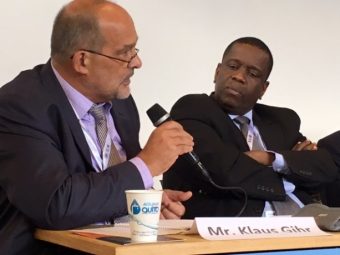 The international community has ended the global housing conference in Quito with the ratification of common guidelines for sustainable urban development in the form of the “New Urban Agenda.” KfW attended many of the conference’s events and presented its activities in cities and worked with other attendees from around the world to find solutions for rapid urbanization.
The international community has ended the global housing conference in Quito with the ratification of common guidelines for sustainable urban development in the form of the “New Urban Agenda.” KfW attended many of the conference’s events and presented its activities in cities and worked with other attendees from around the world to find solutions for rapid urbanization.
The aim of the “New Urban Agenda” is to serve as a guide for sustainable urbanization around the world. It stands alongside the international Sustainable Development Goals (SDGs), the global Climate Agreement and the Development Finance Agenda. Habitat’s Executive Director, Joan Clos, described the new agenda as an “important instrument for enabling national, sub-national and local agencies to achieve sustainable urban development”.
The 24-page agenda also references financial cooperation issues. For example, it explicitly refers to the importance of sustainable financing for the successful implementation of the agenda. The document also mentions residential property finance, urban transport, and the general provision of basic services to all city dwellers.
One of the ways that Germany is helping to implement the agenda is with a new initiative called the “Transformative Urban Mobility Initiative” (TUMI). As part of the initiative, the German Federal Ministry for Economic Cooperation and Development (BMZ) will increase its efforts to promote sustainable urban transport in the emerging economies and developing countries. KfW is playing a crucial part in implementing the initiative on behalf of the German Federal Government, as underscored by KfW Director Marc Engelhardt: “As a development bank, we are playing a very central role in TUMI. We already serve as a reliable partner for sustainable urban development in many different countries. We want to significantly expand our activities in the field of urban mobility in particular. I expect us to commit to new projects with a total volume of around one billion euros both this year and next.” These funds will mainly go towards public transport.
KfW as a municipal financier
Representatives of KfW were involved in a total of ten events at the conference: at the German stand, the UN pavilion, and various official side events including one held by the German Federal Ministry for the Environment, Nature Conservation, Building and Nuclear Safety (BMUB), which was opened by State Secretary Gunther Adler. At the event, KfW presented its activities in connection with the financing of municipalities: “We make crucial contributions and fill in gaps that are not covered by the commercial banks and other investors, both in Germany and in our partner countries,” added KfW Director Felix Klauda.
During the conference it was repeatedly made clear that many cities suffer from a chronic shortage of funds. Against this backdrop, in a discussion with representatives of municipalities in Mozambique, Senegal and Bangladesh, KfW Director Klaus Gihr stated “We have to find new ways of helping cities in developing countries with the financing of projects.” Although there are many of challenges to overcome, it is also clear that “Cities have to make better use of their own resources, and require access to additional funding. Development financiers can and must help them with this.”
At the German stand, KfW reported on projects in India, Bangladesh, and the Palestinian territories in several well-attended podium discussions with its partners. The bank also described its experiences in promoting energy-efficient buildings in Germany and India.
Source: kfw-entwicklungsbank.de



